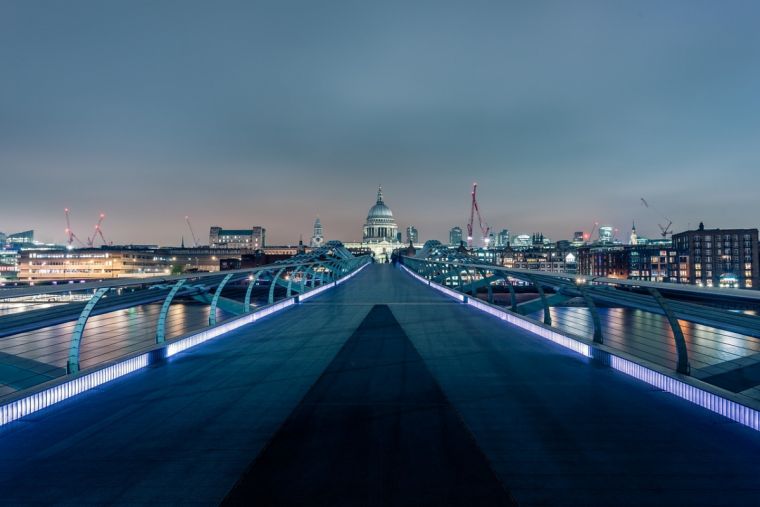The Church In London Is Growing: Here Are 5 Things It's Getting Right

The Bishop of London has retired after 22 years in the job. A towering figure, warm tributes were paid to him at a packed-out St Paul's Cathedral last night.
Those tributes included reflections on how the Church of England in London has gone from decline to growth and from infighting to an outward looking and positive plan. The Economist says: "Weekly participation in Christian services in the capital has grown by 16 per cent since 2005."
The Church of England is, of course, only part of the story of the Church in the capital city. As someone's who's bemoaned the dominance of London over the rest of the country before, it's now time to acknowledge what London is getting right and what the rest of the country and beyond can learn from the Church in the great world city.
Leadership
Churches in London are led by entrepreneurial characters. From the big names, such as the Bishop of London himself, to leading Pentecostal pastors such as Pastor Agu Irukwu of Jesus House, London has leaders who are willing to take risks and to pursue growth in their churches.
They aren't merely glorified managers, though. There are theologians, such as Graham Tomlin, the Bishop of Kensington. There are brilliant communicators like Lucy Winkett, of St James Piccadilly. There are also many, many servant-hearted leaders whose names will be unfamiliar, but who work tirelessly.
Immigration
Immigration has been a boon to the Church in London. On any given Sunday, it's easy to walk the streets and see Nigerians, eastern Europeans and South Americans all dressed up for church.
Within my own parish in east London, there is a Lithuanian Catholic congregation, a Spanish speaking church, two pentecostal congregations and an independent evangelical group pastored by an American. That's in addition to the diversity within our own congregation.
This diversity has boosted flagging denominations and given new life and vibrancy to the London Church scene.
Diversity
Immigration is responsible for much ethnic diversity as well as a huge range of worship styles across the capital. Yet the diversity goes well beyond that. Churchgoers in London are 10 years younger, on average, than the rest of the country. This is partly because London has a younger demographic anyway, but it's also due to the range of churches which offer young people a place to feel at home.
The diversity in types of worship available is unrivaled anywhere in the world. With two Roman Catholic cathedrals, two Anglican cathedrals and any number of other options for Orthodox, Lutheran, Coptic and other traditions, there is always a type of worship to suit you. Alongside this the arena-type services of Hillsong and other independent evangelical churches mean that all types of Christian expression are here.
Rich and poor worship in churches in London – although there is much more to do to get them to meet alongside each other regularly.
Ecumenism
Ecumenism isn't a very exciting word to many. But London shows what it can look like on the ground. When Church of England, pentecostal and independent congregations can come together to fill large venues in joint services it's a great witness.
Similarly, when there is such obvious respect between more traditional denominations, there is a practical ecumenism which develops. Instead of sitting around discussing their differences in theology, churches are uniting to staff food banks, offer credit union access points, get out with Street Pastors and much more besides. Of course this is happening in other places too, but in many ways London leads the way. Organisations such as Citizens UK, which has pioneered the Living Wage Campaign and work for more affordable housing, bring together hundeds of London's churches.
Prayer
There's a daily rhythm of prayer in London that probably isn't matched by many cities around the world. With thousands of churches across the city praying every day, it's hard to quantify the impact. Yet what's for sure is that for hundreds of years, there have been daily prayers from faithful Christians.
Churches dot the cityscape. Standing outside Westminster Abbey, the heart of the Anglican establishment in London, you're only a stone's throw from Methodist Central Hall Westminster (where the UN was founded), and just minutes from the centre of Roman Catholicism for England and Wales at Westminster Cathedral. Evangelical churches like the Emmanuel Centre and Westminster Chapel are just yards away. And so it goes on. Surely the combined prayers of these saints for their city over hundreds of years have made a difference?
Of course, not all of this list is replicable. Some factors are unique to London and could be difficult to reproduce in other urban areas, let alone the countryside. But London needn't be replicated. It can simply serve as an example for what might be possible in contexts around the country and the world.
Follow Andy Walton on Twitter @waltonandy











